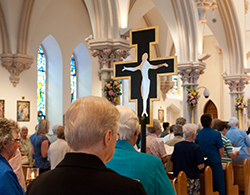Aston, PA—As institutional investors concerned about economic security, I support the Clean Power Plan proposed rule because it is good for business, good for public health, and it demonstrates the leadership the global community needs to address; namely, the severity, urgency and geo-political impacts of climate change. Also, as a Sister of St. Francis of Philadelphia, my faith calls on me to take action because of the significant impact of climate on low-income and vulnerable people, both within this country and around the world. I believe this strong policy to dramatically reduce carbon emissions will play a critical role in avoiding irreversible impacts on the environment, economies, and the health and well-being of our planet’s inhabitants.
Socially responsible and faith-based institutional investors embrace the EPA’s proposed Clean Power Plan rule to reduce carbon emissions from existing power for three reasons: First, because decisive action on the part of the U.S. is needed to successfully address global climate change. Second, the implementation of this rule will positively impact the health and well-being of vulnerable populations across the globe. Third, because the rule will benefit the business community by providing incentives for innovation and by creating new jobs in our transition to a low-carbon economy.
The Sisters of St. Francis of Philadelphia, as responsible stewards of our community’s pension fund, has been engaging major oil and gas companies to encourage them to mitigate their impact on climate change, and this policy is what is needed to compel even greater action. We do this work in partnership with the Interfaith Center on Corporate Responsibility (ICCR), a coalition of several hundred faith-based and mission-driven institutional investors with over $100 billion in invested capital, who view the management of our investments as a powerful catalyst for social change. We press companies to address the impacts of their operations on communities. This rule will not only reduce our GHG emissions, but will help improve the health and well-being of communities around polluting facilities.
Our concern for the climate comes from our respect for the sacredness of creation and the impacts of global climate change on all species, particularly the most vulnerable on our planet such as the economically disadvantaged who are less able to adapt and are often more dependent on climate-sensitive resources such as local water and food supplies. As Franciscans, we commit ourselves to preserving the integrity of the land entrusted to our care, to dialogue and to explore with others the importance of eco-spirituality, human rights and environmental justice.
As investors, we know that nearly every company in every sector sees climate change as a material risk. Water availability, supply chain disruptions, and the physical and structural dangers presented by extreme weather hazards are not negligible considerations for multinational corporations with operations across the globe, and by extension, for us, their investors. Our country’s need to act on climate change is certain.
The State of Pennsylvania ranks third in the nation for global warming pollution, yet, the Pennsylvania House of Representatives, in advancing H.B. 2354, has placed political expediency ahead of the common good. This half-measure will likely result in a plan that will fail to adequately clean up Pennsylvania’s power plants and force the EPA to act on the state’s behalf.
We understand concerns that closing coal-fired power plants will hurt jobs in Pennsylvania. But as we think to the future – there is a clear need to innovate and create the technology and infrastructure for a low-carbon technology. This rule presents opportunities for Pennsylvania to continue to build on our use of renewable energy and to be a leader in solar and wind energy, and innovative technology. We must seize this opportunity – it is good for the planet, good for our community, and good for the economy. We must be prudent if we are to increase our use of natural gas and consider the real impacts on communities and water supplies.
We encourage community consultation in the development of our state’s plan and encourage Pennsylvania to be focused on energy efficiency and renewable energy. While the rule may not be perfect, it demonstrates the leadership and clarity we need, and enables our state to craft the appropriate plan to reduce our net emissions.
As faith based institutional investors, the Sisters of St. Francis of Philadelphia and our ICCR partners, support the Clean Power Plan and encourage Pennsylvania to seize this opportunity to support innovation and a new economy for our state. Our most vulnerable are counting on us.







